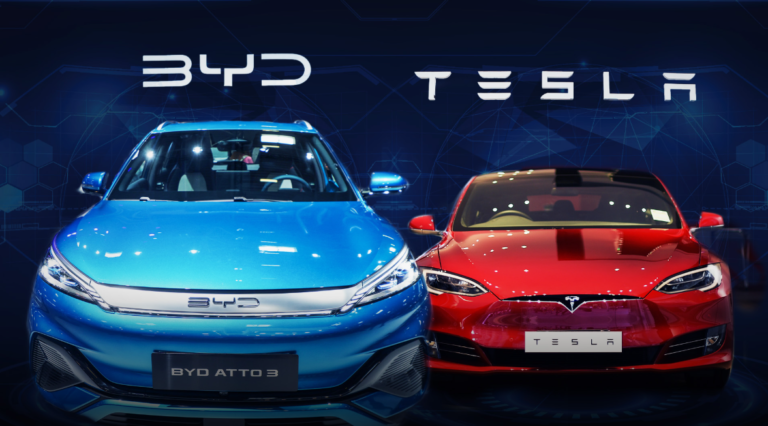BYD: The Journey from Battery Manufacturer to the World’s Largest Electric Vehicle Producer

Just a decade ago, few could have imagined that a Chinese company known for its budget phone batteries would become the world’s largest manufacturer of electric vehicles (EVs). At the end of 2023, BYD surpassed Tesla and, for the first time in a quarter, sold more battery electric vehicles (BEVs) than Tesla.

BYD’s Journey: From Humble Beginnings to Global Leader
BYD (Build Your Dreams) was founded in 1995 by chemist Wang Chuanfu with just 20 employees. Initially, the company produced lithium-ion batteries for mobile phones. As the smartphone market grew, BYD began supplying batteries to companies like Motorola and Nokia, quickly scaling up.
In 2003, BYD acquired the car manufacturer Xiang Qing Shuan Automobile and established BYD Auto. The first BYD car, the F3 (similar to the Toyota Corolla), was launched in 2005. Compact and affordable, it quickly gained popularity.
Entering the EV Market and a Success Story
In 2008, BYD released the world’s first mass-produced plug-in hybrid vehicle, the F3DM, though it flopped. A pivotal moment came when businessman Warren Buffett recognized BYD’s potential and invested $232 million in the company.
Battery Innovation: BYD’s Key Weapon
In 2020, BYD introduced the Blade Battery, a lithium-iron-phosphate (LFP) battery. It was cheaper, safer, and more compact. Batteries account for 40% of an EV’s total cost, and BYD solidified its position in battery production, enabling it to cut costs compared to Tesla and other competitors. Even Tesla acknowledged the quality of BYD’s batteries and began purchasing them.
BYD vs. Tesla: The Battle for EV Dominance

Tesla has long dominated the EV market with its design, technology, and brand, but BYD has focused on affordability, mass production, and vertical integration. In Q4 2023, BYD sold 526,000 battery electric vehicles, while Tesla sold 484,000. BYD holds a 35% share of the EV market in China, compared to Tesla’s mere 7.8%.
BYD’s Core Strength: Vertical Integration
A key reason for BYD’s success is vertical integration—the company produces over 75% of its components in-house. This reduces costs, avoids supply chain issues, and boosts production efficiency.
Global Expansion: BYD’s International Strategy

BYD is no longer confined to China and is actively entering the global market. In Europe, BYD penetrated 15 countries in just 11 months, competing with Volkswagen, BMW, and Mercedes. It became the official EV sponsor of the Euro 2024 football championship. BYD is already a market leader in Southeast Asia and Australia. New factories are being built in Brazil, Hungary, and other countries to circumvent potential import tariffs.
Challenges Facing BYD
Trade Restrictions in Europe: The EU is considering additional taxes on EVs from China, which could raise BYD’s costs.
Brand Identity: Unlike Tesla, BYD lacks a premium image. To succeed globally, it will need to strengthen its brand value.
Competition: In China, companies like NIO, XPeng, and Li Auto are rapidly growing. Volkswagen, Ford, and Toyota are also heavily investing in the EV market.
Dependence on China: BYD’s success still hinges on the Chinese market. Any shifts in government policy or increased competition could force the company to bolster its international presence.
The Future of the EV Industry: Can BYD Maintain Its Lead?
The EV industry is evolving rapidly, and the battle between BYD and Tesla is far from over. BYD has proven that affordability and innovation can outweigh brand prestige. However, Tesla retains an edge in global recognition and technology.
The next 3-4 years will determine whether BYD can sustain its leadership or if Tesla will reclaim the top spot.
What do you think? Will BYD dominate the EV market, or will Tesla become number one again? Share your opinion in the comments!


